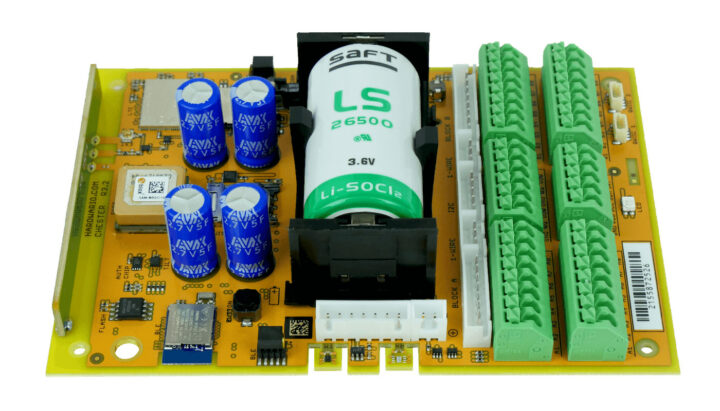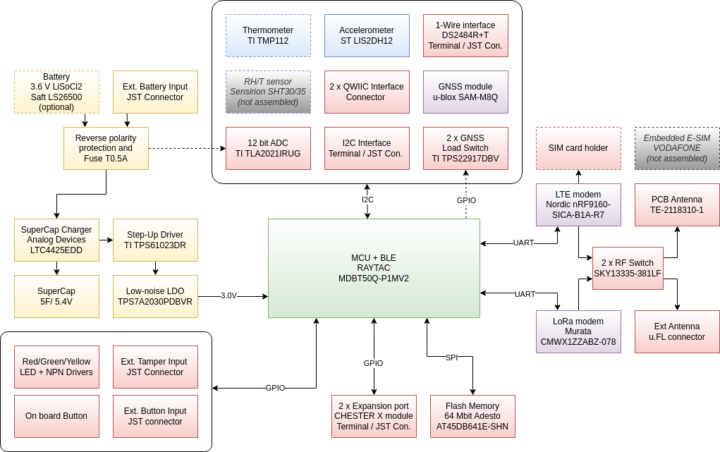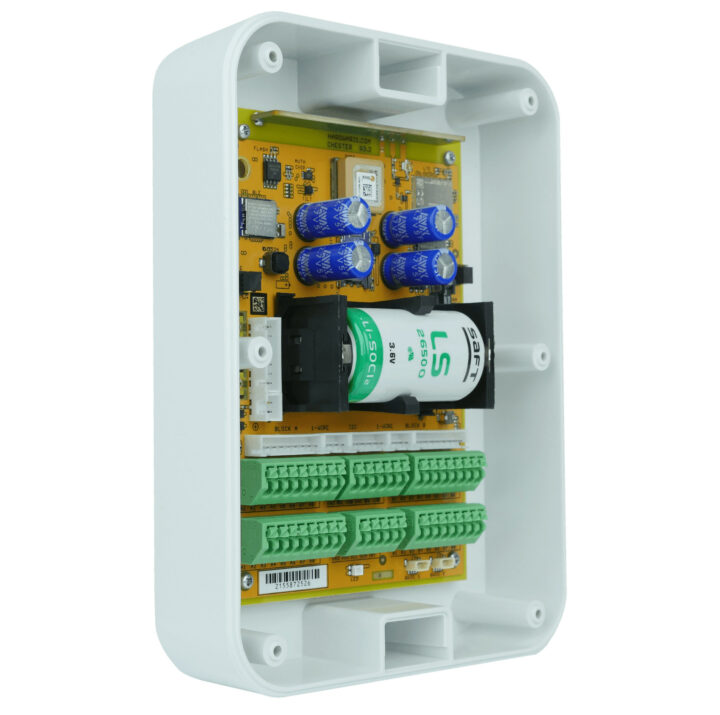HARDWARIO CHESTER platform is a configurable LPWAN IoT gateway whose main function is to connect as many devices and environments as possible to the Internet using connectivity such as LoRaWAN, LTE Cat M1, or NB-IoT, as well as GNSS for geolocation.
Contrary to most IoT gateways, it does not run Linux on an application processor, and instead, the “brain” of the CHESTER IoT gateway is a Raytac Bluetooth 5.0 module based on a Nordic Semi nRF52840 Arm Cortex-M4 microcontroller running Zephyr real-time operating system, which connects to LTE IoT modem and a LoRaWAN module through UART, and expansion modules through I2C, 1-wire, and GPIO interfaces.

HARDWARIO CHESTER specifications:
- Wireless modules/chips
- Raytac MDBT50Q-P1MV2 Bluetooth 5.0 module based on Nordic Semi nRF52840 Arm Cortex-M4F MCU with 1MB Flash memory, 256kB RAM
- Nordic Semi nRF9160-SICA-B1A-R7 LTE-M/NB-IoT system-in-package (SiP) with Arm Cortex-M33 MCU, 1024 KB flash, 256 KB SRAM
- Murata CMWX1ZZABZ-078 LoRa module as found in Arduino Portenta Carrier board with STM32L0 Arm Cortex -M0+ MCU @ 32 MHz with 192 KB Flash memory, 20 KB RAM, 20 KB EEPROM, Semtech SX1276 transceiver
- u-blox M8 for GNSS (GPS, Galileo, GLONASS)
- Storage – 8MB SPI NOR flash memory connected to Raytac module for data logging
- Expansion interfaces
- Push-in terminal blocks and JST connectors with
- GPIO
- I2C bus
- 1-Wire bus (using hardware bus driver with strong pull-up capability) for multiple DS18B20 thermometers, HARDWARIO Machine Probe, HARDWARIO Soil Sensor
- 2x Sparkfun Qwiic I2C connectors
- Supported CHESTER extension modules:
- Digital inputs – Dry contacts, PLC outputs
- Digital outputs – Power relays, Open collector
- Analog inputs – Signal 0-10 V; Signal 4-20 mA
- Communication – RS-485, RS-232, wM-Bus, 1-Wire, UART, I2C
- Sensors – Digital I2C thermometer, 3-axis MEMS accelerometer
- Push-in terminal blocks and JST connectors with
- Misc – 3-color RGY LED, push-button
- Power Supply
- Battery
- 7,700 mAh/3.6V Li-SOCl2 (Lithium Thionyl Chloride) battery OR
- Rechargeable battery from CHESTER-Z top-cover module
- External power delivered via extension modules for 24V input, solar panels, etc…
- Operating voltage range – 2.0 to 5.25 V
- Battery
- Power Consumption
- Typical idle current – 100 μA (without any extension module and peripheral installed)
- Extra current for BLE – 50 μA with 1-second advertising interval
- Extra current for NB-IoT/LTE-M – 100 μA for ECL=0 and 30-minute transmission interval
- Extra current for LoRaWAN – 50 μA for SF12 and 30-minute transmission interval
- Dimensions
- Standard enclosure – 130(w) x 175(h) x 45(d) mm
- Carrier board – low profile enclosure – 200(w) x 280(h) x 45(d) mm
- Carrier board – high profile enclosure – 200(w) x 280(h) x 65(d) mm
- Temperature Range – Operating: -30 to +60°C; storage: -30 to +70°C
- Protection level – IP67 (immersed in 1 m depth for 30 minutes)

So basically, you can select various enclosures and modules to build a CHESTER gateway that meets your exact requirements by plugging modules into the mainboard. The company provides catalog applications for the CHESTER platform such as “CHESTER Clime” (temperature and humidity sensing, IAQ monitoring, DS18B20 transmitter) or “CHESTER Push” (Event alerting on 4x push button with optical and acoustic feedback) to quickly get started with firmware and hardware that works out of the box.
The CHESTER open-source SDK built on top of the Zephyr operating system is available with all tools and source code, including for the aforementioned catalog applications. The SDK works on Ubuntu 20.04/22.04, macOS 11/12, and Windows 10/11, but Windows is not recommended due to very slow build times. The SDK can be found on GitLab, but access requires a partnership agreement with HARDWARIO. But extensive documentation is publicly available both for the hardware and software, although I did have to come up with the specifications above by myself, by looking at various pages in the documentation and the block diagram above.
A CHESTER devkit and catalog applications can be purchased on the company’s store for 268 to 375 Euros excluding VAT depending on the model. More details can be found on the product page, and HARDWARIO will give a talk entitled “Introducing CHESTER Platform for Industrial IoT Applications” at the Embedded Open Source Summit 2023 on June 29 mostly focusing on the Zephyr SDK:
In this talk, Pavel will introduce the CHESTER platform, which helps developers to address many industrial IoT use cases requiring LPWAN (LTE-M, NB-IoT, LoRaWAN) or satellite connectivity. CHESTER scales to many applications because of its rich hardware extension module ecosystem and multiple Zephyr RTOS mechanisms, which help developers craft a truly modular software design.
HARDWARIO (the CHESTER platform vendor) provides CHESTER SDK, which imports nRF Connect SDK (NCS) from Nordic Semiconductor. This layer has multiple reference application implementations, subsystems, drivers, samples, and shields. All those additions, altogether with the Zephyr RTOS and NCS foundations, give CHESTER users (even newcomers) the super-powers to develop and deploy industrial IoT applications in a fast manner. The talk may inspire any IoT firmware engineer about the often forgotten paradigms, such as modularity, re-usability, coherency, and cross-dependency avoidance.

Jean-Luc started CNX Software in 2010 as a part-time endeavor, before quitting his job as a software engineering manager, and starting to write daily news, and reviews full time later in 2011.
Support CNX Software! Donate via cryptocurrencies, become a Patron on Patreon, or purchase goods on Amazon or Aliexpress





